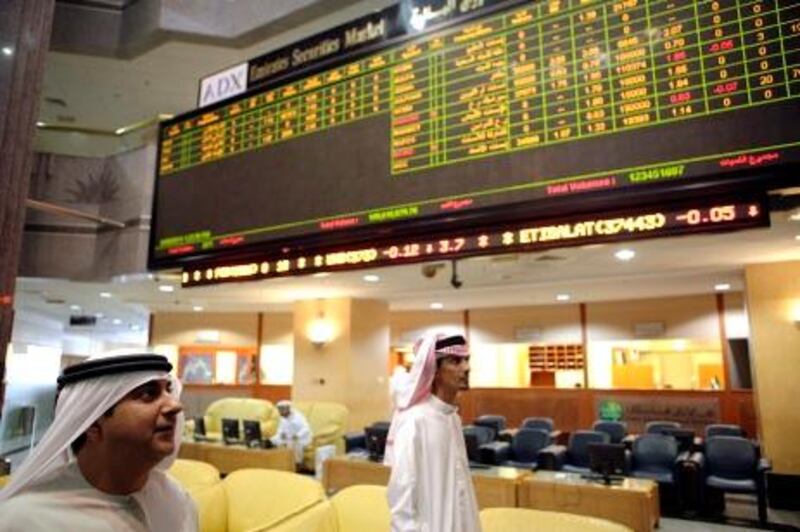Investor optimism is rising ahead of a decision this month by MSCI about a promotion of the UAE to "emerging" market status.
Finance:
Industry Insights Exclusives you can bank on from The National's premium content. Learn More
Such a move would give the country's flagging bourses a much-needed tonic.
Any upgrade would open the country to a global market of US$3 trillion (Dh11.01tn) in funds benchmarked against MSCI's indexes globally.
"A lot of big funds around the world track MSCI so if the UAE was admitted it would mean a lift in inflows and a positive reaction in the market," said Paul Gamble, the head of research at Jadwa Investment in Saudi Arabia.
Instability in the Arab world and the impact of the euro-zone debt crisis have taken their toll on regional and global markets this year, shaking investor confidence. An exodus of capital from the Middle East has contributed to the Dubai Financial Market General Index losing 15 per cent of its value so far this year. A total of 10 per cent has been shaved off the Abu Dhabi Stock Exchange General Index.
But Abu Dhabi's shares closed at their highest level in a week on Wednesday before the National Day weekend, partly driven by optimism stemming from an increase in the foreign ownership limit at First Gulf Bank. The rise in the bank's foreign ownership limit from 15 per cent to 25 per cent was the latest sign of progress being made in meeting the index provider's requirements ahead of a decision this month.
MSCI in June delayed until this month a decision on whether to lift the UAE - along with Qatar - from its "frontier" market ranking.
Fund managers shy away from investing in frontier markets because of their volatility and associated risks. But emerging markets are perceived as more stable and liquid, acting as a window for portfolio investors.
"Liquidity has been very low across the Middle East this year, particularly in the UAE, so any increase in the exposure of this region to global investors is positive," said Said Hirsh, a Middle East economist at Capital Economics. Caps on foreign ownership of companies, acting as a barrier to enticing greater overseas investment, was considered one of the reasons for MSCI's decision to delay.
Under existing law, firms are limited to a maximum 49 per cent foreign ownership apart from in free zones.
Another of the requirements for the UAE to reach emerging market status was to improve its securities lending system. Under the former system an investor would make a payment for a security to a bank, which then paid for the security. Since May, a so-called delivery versus payment (DvP) system has been introduced, in which securities are delivered and cash received on the same day, that is considered a key component for the upgrade.
Officials have also strived to push through other updates to regulations. This month, the Securities and Commodities Authority said it would consult banks and brokerages on changes to stock market regulations. Market making, securities lending and the provision of liquidity and short selling would be covered by the regulations, it said. The new rules would boost the country's regulatory framework compared to other regional bourses.
The proposed changes are intended to allow traders to take a more active role in buying and selling stocks, otherwise known as market making, which ensures any investor can always close out of a deal when he or she chooses to do so.
The availability of securities lending and short selling are among the market features favoured by the MSCI.
Both are common in other parts of the world but have been outside regulation in the UAE.
The availability of new tools is intended to help revive trading, which has diminished steeply since the beginning of the global financial crisis. The value of stocks traded on the Dubai Financial Market in October was 97.2 per cent below the peak in November 2007. Almost half of the 110 brokerages in the UAE have closed in the past 12 months. One of the latest to do so was HSBC Middle East Securities, the local brokerage arm of HSBC Holdings Group.
twitter: Follow and share our breaking business news. Follow us





